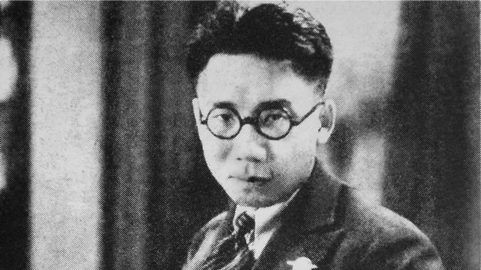Fei Mu

Song of China (Fei Mu & Luo Mingyou, 1935) – March 3, 2017
There’s a lot of really interesting background on this film, its production, and eventual release in the US at The Chinese Mirror. To summarize: this was an attempt by the Lianhua studio to make a hit following the suicide of its biggest star, Ruan Lingyu. It didn’t quite work, but the film was picked up by an American producer who liked it and he released it in the US, the first Chinese film to be so distributed. Setting the pattern for the next 80+ years of Chinese film distribution in America, however, said producer recut the film, drastically changing its ending, and redid the score and the intertitles to fit better the Orientalist preconceptions of the American audience. An example cited by the above article:
The titles perpetuate the Western myth that Chinese, even common people, only speak in flowery complex sentences. For example, at one point the intertitles relate the passage of time, in English, as:
“Seven times the pear tree has come into blossom”
The actual Chinese intertitle: “Seven years later”
What remains of the film is a 45 minute fragment, missing at least one reel, with the bastardized American ending. But it’s one of the few surviving films from director Fei Mu, serving here as co-director. It’s about one man’s struggle to live up to his dead father’s value system (care for children and old people) while his son revels in the glossy temptations of modern life. He moves the family (wife, son, daughter, daughter-in-law (pernicious, naturally), and grandson) back to the country, where they hope to reconnect with traditional Confucian virtues. The man does, but the younger generation is unsalvageable and eventually returns to the city. What happens next depends on the extant version, of which three are known to exist (the article above explains them all).
This is strictly fairy tale parable stuff, but Fei and Luo Mingyou complicate it in ways you can barely see through the American nonsense. Most especially in the story of the daughter, who falls in love with a man who doesn’t respect tradition. Her parents catch her in the act of eloping, a latticework screen separating her from the camera, literally imprisoning her as she slowly retreats back into her room. Obvious as it is, the film would be unbearably didactic were it not for such expressionist touches.
Adding to the unease is this idea of dragging one’s family out to the country to reconnect with “real values” outside of corrupt modernity. It’s really not so different from the forced relocations of Mao’s various schemes to break the bourgeoisie and (increasingly, as time passed) his political opponents, up to and including the Cultural Revolution. The conflation of tradition and morality, and its corollary glorification of the rural over the urban, is particularly pernicious, and it remains a driving force behind contemporary politics around the globe.
Spring in a Small Town (1948) — January 17, 2019
A mood. The impossibility of putting life back together after everything has fallen apart.
